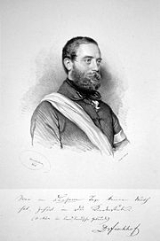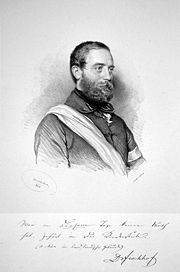
Adolf Fischhof
Encyclopedia

Óbuda
Óbuda was a historical city in Hungary. United with Buda and Pest in 1873 it now forms part of District III-Óbuda-Békásmegyer of Budapest. The name means Old Buda in Hungarian...
, Hungary
Hungary
Hungary , officially the Republic of Hungary , is a landlocked country in Central Europe. It is situated in the Carpathian Basin and is bordered by Slovakia to the north, Ukraine and Romania to the east, Serbia and Croatia to the south, Slovenia to the southwest and Austria to the west. The...
- March 23, 1893, Emmersdorf, today a part of Klagenfurt
Klagenfurt
-Name:Carinthia's eminent linguists Primus Lessiak and Eberhard Kranzmayer assumed that the city's name, which literally translates as "ford of lament" or "ford of complaints", had something to do with the superstitious thought that fateful fairies or demons tend to live around treacherous waters...
, Carinthia) was a Hungarian-Austrian
Austrians
Austrians are a nation and ethnic group, consisting of the population of the Republic of Austria and its historical predecessor states who share a common Austrian culture and Austrian descent....
writer and politician of Jewish descent.
After studying medicine
Medicine
Medicine is the science and art of healing. It encompasses a variety of health care practices evolved to maintain and restore health by the prevention and treatment of illness....
(1836–1844) he was appointed physician at the Vienna
Vienna
Vienna is the capital and largest city of the Republic of Austria and one of the nine states of Austria. Vienna is Austria's primary city, with a population of about 1.723 million , and is by far the largest city in Austria, as well as its cultural, economic, and political centre...
hospital. Fischhof was one of the leaders in the revolutionary movement of 1848, commanding the students' legion of Vienna
Academic Legion (Vienna)
The Academic Legion was a military organization formed by university students in Vienna during the Revolutions of 1848. It played a key role in toppling the government of Clemens Metternich and precipitating his retirement on 13 March 1848...
and presiding over the Committee of Public Security. He was especially prominent in the Constitutional Assembly
Constitutional Assembly
The Constitutional Assembly was a body elected in 1955 to draw up a permanent constitution for the Republic of Indonesia. It sat between November 10, 1956 and July 2, 1959...
(Reichstag), in which he represented one of the Vienna districts. In the Liberal cabinet of Doblhoff
Baron Anton von Doblhoff-Dier
Baron Anton von Doblhoff-Dier was an Austrian statesman.Born in Gorizia, he studied law at the University of Vienna and at first entered into civil service. In 1836 he retired to cultivate the manor estate of his uncle at Weikersdorf Castle in Baden, where he excelled in agronomic studies...
he was attached as counsellor to the Ministry
Ministry (government department)
A ministry is a specialised organisation responsible for a sector of government public administration, sometimes led by a minister or a senior public servant, that can have responsibility for one or more departments, agencies, bureaus, commissions or other smaller executive, advisory, managerial or...
of the Interior. After the dissolution of the Kremsier Parliament
Kremsier Parliament
The Kremsier Parliament was a constituent assembly called in July 1848 in reaction to opposition to the Pillersdorf Constitution of 25 April 1848 and would last until its dissolution on 7 March 1849...
, March 7, 1849, Fischhof was arrested, accused of rebellion and high treason, but was acquitted after an imprisonment of 9 months. He devoted himself to the practise of medicine until about 1875, when failing health compelled him to retire.
With Joseph Unger
Joseph Unger
Joseph Unger was an Austrian jurist and statesman. Having studied law at the university of his native city, he in 1850 was appointed assistant librarian, and in 1852 privatdozent, at his alma mater. The following year he was called to Prague as assistant professor at the university, and in 1855 to...
, later a member of the Austrian cabinet, he published in 1861 a pamphlet entitled "Lösung der Ungarischen Frage", in which he pleaded for the division of the empire into Austria and Hungary. After the Austro-Prussian war
Austro-Prussian War
The Austro-Prussian War was a war fought in 1866 between the German Confederation under the leadership of the Austrian Empire and its German allies on one side and the Kingdom of Prussia with its German allies and Italy on the...
of 1866 Fischhof wrote "Ein Blick auf Oesterreich's Lage", and strongly advised an alliance with Germany. In his "Oesterreich und die Bürgschaften Seines Bestandes", 1869, he recommended an autonomous constitution for Austria.
In his publications Fischhof strongly advocated a federal organization of the Austrian Empire and a high degree of autonomy for national minorities. His views contrasted with the centralistic outlook of the German Liberal cabinet that was appointed by Emperor Francis-Joseph in 1867. It was believed that centralism would guarantee a German majority and safeguard the liberal reforms that were introduced by this cabinet. Fischhof, however, stated that true liberalism would guarantee not just individual liberties for Austrian citizens but also national liberties for Austria's national minorities. He was convinced that only federalism could prevent a break-up of the Habsburg Monarchy along national lines. This, he believed, would ultimately lead to German or Russian domination over the small nationalities in Central Europe and end the relative freedom they enjoyed under Habsburg rule. History was to prove him right.
After the collapse of German Liberalism in 1879 and the coming to power of a clerical-conservative government that could count on Slav support, Fischhof, in the conjunction with Ernst Baron Walterskirchen, planned in 1882 the foundation of a German-Austrian people's party. This party should act as a mediator in the question of nationalities and unite all liberal elements of the empire; but his efforts were frustrated by the resistance of the main stream German Liberal constitutional party.
The views of Fischhof not only differed from those of the majority of German-Liberals, but also from those of the Jewish bourgeoisie that, just as Fischhof, identified strongly with the principles of liberalism. Unlike Fischhof most middle class Jews supported main stream German-Liberalism well into the 1880s, when it had long proven to be unable to stop the radicalization of Austrian politics and the growing anti-semitism that was part of this.
Literary works
- "Zur Erweiterung der Munizipalautonomie" (1868);
- "Zur Reduktion der Kontinentalen Heere" (1875);
- "Die Sprachenrechte in den Staaten Gemischter Nationalität" (1885);
- "Der Oesterreichische Sprachenzwist" (1888);

